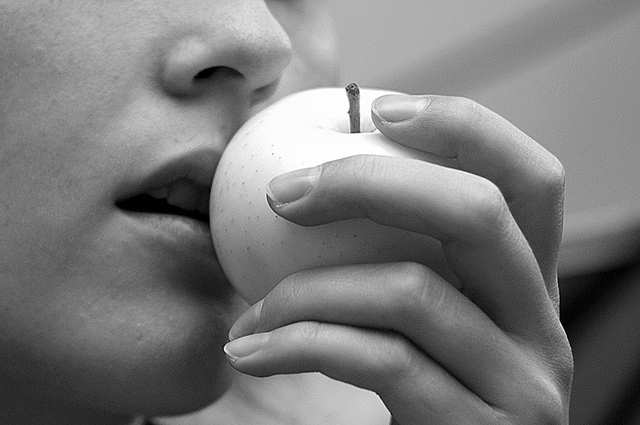How we eat is just as important, if not more important, than what we eat.
Yes, it’s a good idea to eat healthy foods. That will always be true. But there’s so much more to explore here.
The energy that we bring to our meals can completely change the way food moves through our body and provides nourishment.
Case in point: I’m currently sitting at Whole Foods enjoying good wifi and outstanding people watching, and the girl at the table next to me is about my age, she’s wearing yoga pants, Ugg boots and a sweater. My immediate thought is that she’s friend material. She has a slice of cheese pizza and a coconut water.
But she’s eating so quickly while on her phone that it’s making me feel nervous. I keep thinking: “Chewwwwww! Your stomach doesn’t have teeth.”
As soon as I notice what is happening in my own body just observing her, I take a deep breath and ground myself by feeling my feet, my connection to my seat and my body.
How we eat matters. Mealtimes can be one of the most mindful moments of our day or a time when we go totally unconscious.
I have been experimenting with my own mindset around food lately—I love a good experiment! And I’m finding over and over again that how I eat, the environment I create for myself, the things I say to myself while eating, the way I chew and when I choose to stop eating all affect how the food digests and my own body image.
Sitting down as opposed to eating on the go or standing at the kitchen counter signals to your body that it’s safe to digest. Putting away technology while eating provides an opportunity for you to read cues from your body that it’s had enough. If I’m distracted by something on my phone or computer I tend to eat mindlessly by doing that thing where I go for another bite without realizing I’ve eaten it all already.
Here’s what else I’ve been noticing:
1. Intention is everything.
If we sit down to eat a meal with the intention that it will serve our body well, provide nourishment and leave us feeling light and good, it does just that. When we eat without setting intention, which often happens when we are in a rush, we tend to overeat and feel incomplete after the meal.
Personally, I notice that when I eat with intention for the highest good of my body, I feel thin, fit and healthy, no matter what I’m eating. At the meals when I neglect setting that intention, I feel thick, slow and judgy about my body.
2. Taste, texture and breathing are helpers.
As long as we are aware of (and come back to) our breath while eating we will stay more present to the taste and texture of the food. This is helpful because we can immediately notice when it no longer tastes good. It’s a literal sensation on the tongue, like a coating, and it signals that it’s time to pause and ask the body if it’s complete with that food.
Take a full inhale and then exhale before bringing food to your mouth. Notice the food. Are you attracted to the way it looks, smells and tastes?
If you’re eating with someone else watch how they are eating. Do they eat quickly? Do they chew thoroughly or only a few times and then swallow. Do you feel peaceful or stressed watching them eat?
Take another inhale and then exhale. What do you notice in your own body? Observing others can provide wonderful contrast and help bring clarity to how you would like to eat and feel around mealtimes. In the high-energy frenzy of a group meal, it can be as simple as setting down your fork, taking a deep breath, observing those around you and then proceeding with your meal with greater awareness and calm.
3. Be in conversation with your body.
That’s what mindful eating is all about. You can ask your body: Have you had enough? Would you like some more? This tastes good to me, how does it feel to you?
Our body is speaking to us all the time and will provide cues when it has had enough. For some it’s a pause in eating. It looks like a noticeable slowing down accompanied by a deep breath and sometimes resting a hand on the head or hip. If something isn’t jiving with our body, the tongue is often the first to send a message. The flavor will taste off and we may notice a decreased desire to take another bite.
In the early stages it may feel like work to slow way down and open up this dialogue, but soon you become engaged in the conversation effortlessly. You may be surprised how much or little food you actually need when you start checking in with your body and what foods your body prefers over others at certain times.
Of all the work I’ve done over the years, synchronizing my mind and body has been one of the most worthy practices. Cultivate the conversation, work with your body and let it help you get to where you want to be!
Something to try:
• What if you chose to believe that everything that enters your mouth is going to expertly nourish your body?
• What if you could sincerely look at your food and see its potential no matter what it is? You’ll find that you become an expert truth-teller and foods that have little potential begin to feel like the fakes that they are.
• What if you really looked at your food and said thank you to it before you began eating?
Give these a try for a day and see what you notice. Get ready for your mind to be blown.
~
Author: Lacy Young
Editor: Travis May
Photo: Flickr/Sergey Khancha












Read 0 comments and reply